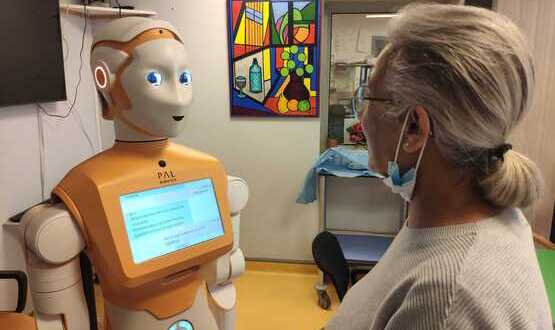National Robotarium socially assistive robot trial collaboration concludes
- 1 February 2024

Researchers from the National Robotarium in Edinburgh have been testing out socially assistive robots in a Paris hospital to help assist patients with simple tasks, calm any anxieties and relieve pressure on nursing staff.
The SPRING (Socially Assistive Robots in Gerontological healthcare) trial used robots that were equipped with advanced AI capabilities to allow them to naturally converse with patients, understand their needs and to help assist hospital staff with routine tasks. It then carried out three waves of experiments with elderly volunteers at Assistance Publique Hôpitaux de Paris.
The researchers found that the robots played a key role in helping to lower infection transmission risks, by reducing potential physical contact between clinicians and patients. In addition, they were able to successfully engage with patients in social situations such as greeting them, answering questions and providing directions.
The use of robots to carry out routine and repetitive tasks helped relieve the pressure on healthcare staff, leading to a more productive workforce.
Professor Anne-Sophie Rigaud, head of department at Assistance Publique Hôpitaux de Paris, said: “Our patients are increasingly interested in robotics and the evolution of hospital services, which they see as the logical evolution of our society. We believe that the ARI robot could in future become an essential element of patient care in hospitals, thanks to its capacity for social interaction and guidance.
“Older adults have also expressed that they’re pleased with the design of the robot and thought that it would be useful to provide information and companionship to patients with cognitive disorders.”
Advances in LLMs
Academics at the National Robotarium have made huge advances in developing large language models (LLM) that enable the capabilities of robots to have natural and fluent conversations with groups of people.
The SPRING project has found that robots are increasingly more adept at following dialogue between multiple individuals simultaneously. The research has delivered more insight into how this emerging technology could be used to enhance care delivery and safety while at the same time advancing innovations with potential for further global applications, like audio processing and human-robot interaction.
Oliver Lemon, professor of AI and academic co-lead at the National Robotarium, said: “One of the most significant contributions of robotics and AI is its ability to conserve resources and alleviate human workload, therefore providing valuable new tools for enhancing healthcare delivery.
“The prospect of robots seamlessly collaborating with hospital staff to enhance the patient experience is now closer to reality. Promising initial trials at Assistance Publique Hôpitaux de Paris have demonstrated our robot’s ability to converse effectively with patients and their companions simultaneously.
“We believe that the SPRING project marks a significant milestone in the development of interactive robotics, and we are proud of its achievements, while recognising the exciting challenges that lie ahead.”
The €8.4 million SPRING project is a collaboration between researchers from Heriot Watt University, the National Robotarium, the Czech Technical University, Bar Ilan University Israel, University of Trento Italy, Assistance Publique Hôpitaux de Paris, PAL Robotics Spain and ERM Automatismes France. It is coordinated by Inria France and received support from Horizon 2020, an EU-funded programme.




